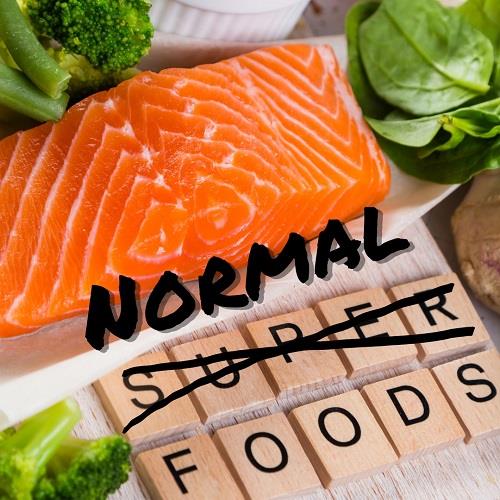This is part 1 of a two-part article. This part addresses the myth of superfoods and part 2 – one week from today – will present ideas for superfitness: ways to enhance the brain health benefits of exercise by using specific strategies.
It is at once not particularly surprising yet still alarming to note that highly processed foods made up 58% of calorie intake and 90% of the sugar intake for just over 9,000 people in a typical day. (Steele, 2016) In general, processed foods have become popular due to their convenience, availability, and unnaturally amplified flavor.
There’s No Such Thing as a SuperFood
There’s this relatively new concept of “superfoods,” but there’s really no such thing. For most of human history there was just food. There have been no newly discovered foods that act like nutritional superheroes in our bodies. Yes, kale is healthy. But it is healthy in the standard way our bodies have come to expect and in ways that kale has always been healthy. It hasn’t become Super Kale in the last decade. Healthy food is our body’s normal. It’s not super; it is what is expected. And on the junk food side of things, there are countless very new, very distorted and freaky foods that do act kind of like “supervillains” in our bodies.
SuperVillians Are Everywhere
Food is like a world in which there are no superheroes, just a lot of very good but ordinary people, but a good number of supervillains we have created in a lab. It takes a lot of work and time by a lot of good, ordinary people with no superpowers to fight the destruction caused by just a few supervillains. Everything in the healthy category is really just normal and not a superfood. But in the unhealthy food category, most foods have significant, powerful deleterious effects that are not solved simply by eating healthy food at the next meal. Just as one ordinary person cannot undo the damage caused by a supervillian.
The supervillain foods with chemicals, sugars, and fats can distort and disrupt your physiology. And the resulting dietary imbalances rapidly generate inflammation and a kind of hormonal static that can take weeks or months to clear.
If you eat healthfully most of the day, but have a treat each day, you’re actually creating an imbalance.
But don’t just take my word for it. In a study of over 1,000 people in Italy, eating a lot of processed foods is associated with increased risk for suffering a heart attack in people who have heart disease, and dying from heart disease, even if that person followed the plant-based Mediterranean diet and all the other rules for preventing and treating heart disease. (Bonaccio, 2021)
Why am I telling you all this? Because there really are no superfoods, but there are “superexercises.” When it comes to brain health we can supercharge the benefits of exercise. Part 2 will show you what this looks like.
Note: For a succinct and helpful explanation of what ultra-processed, processed, and minimally-processed foods are, see this article.
References
Bonaccio, M., et al., Ultra-processed food intake and all-cause and cause-specific mortality in individuals with cardiovascular disease: the Moli-sani Study, European Heart Journal, 2021; ehab783, https://doi.org/10.1093/eurheartj/ehab783
Steele, E.M., Baraldi, L. G., Louzada, M. L., Moubarac, J. C., Mozaffarian, D., & Monteiro, C. A. (2016) Ultra-processed foods and added sugars in the US diet: evidence from a nationally representative cross-sectional study. BMJ open. 6(3):e009892. https://doi.org/10.1136/bmjopen-2015-009892

